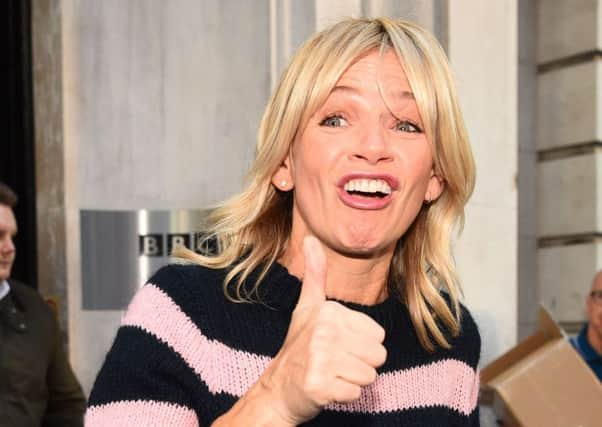BBC Radio 2 serves up Zoe Ball to see off breakfast rivals


Then, on Monday morning, wide-awake or not, Ball will welcome listeners to the all-new Radio 2 Breakfast Show, kickstarting the fiercest battle yet for the most hotly contested slot on the airwaves.
The Strictly Come Dancing: It Takes Two host says she is “not underestimating the enormity of the task ahead”. Radio 2’s breakfast show is the most-listened to programme in Europe, with an audience of nine million.
Advertisement
Hide AdBall is not only the first woman to front the show, she is following in the footsteps of Chris Evans and Terry Wogan, both masters of the medium, with huge personal followings.
As the first woman to host the Radio 1 Breakfast Show solo, from 1998 to 2000, Ball is also aware of the popularity of the slot, which provides the background for snatched breakfasts and the school run, and defines the success, or otherwise of an entire station.
Radio audience numbers rise slowly from 6am and peak at 10am. A successful breakfast show delivers a healthy listening inheritance for the shows that follow.
It is why advertisers pore over the quarterly radio listening numbers for marginal ups and downs in the performance of early-morning shows on commercial networks.
While traditional “live” radio listening is facing a challenge from the rise of podcasts, the breakfast audience is still growing.
“Breakfast radio is incredibly resilient,” says Matt Deegan, founder of the Folder Media radio consultancy, who founded the Fun Kids children’s radio station.
Advertisement
Hide Ad“Over the past 15 years, the audience for it has grown, with 41 million people now listening to breakfast each week.
“The prize of success is huge,” he adds, “as a strong breakfast show drives total listening for a station – and that can have a big affect on advertising impacts and how much money a station generates.
Advertisement
Hide Ad“For presenters, becoming the breakfast-show presenter is still seen as the height of career success. One thing podcasts do have trouble with is replicating the ‘sense of day’ that breakfast radio can reflect.”
Successful breakfast shows make listeners feel part of a daily club. In the week before “going live”, Ball tested pilot shows with her on-air team of Richie Anderson on travel and Mike Williams on sport, trialling the mix of celebrity guests, quizzes, headlines and music she will unveil on Monday. Tina Daheley, a rising BBC News star, replaces Moira Stuart as the programme’s newsreader.
The BBC is parachuting Ball into a milieu undergoing its equivalent of football’s transfer window. On Monday, Lauren Laverne launched 6 Music’s new breakfast show, replacing Shaun Keaveny. Laverne moved from her popular 10am show to 7.30am – a later start for breakfast shows, reflecting the availability of the “indie” station’s listeners.
“I’m quite interested in how we have a start to the day that feels positive but isn’t just fluff – something that is interesting but isn’t just candy floss,” said Laverne of her show, which retained an eclectic musical mix and was greeted positively on social media.
The biggest shock for the BBC was Chris Evans’ departure from Radio 2 to Virgin Radio, the DJ’s “spiritual home”, where he broadcast for five years from 1997.
Evans unveils his new breakfast show on the digital station a week on Monday. Freed from the scrutiny of BBC bosses, the £2m-a-year switch could allow Evans to regain his maverick persona – but he is swapping a station with 15 million listeners for one which currently has just 413,000.
Advertisement
Hide AdVirgin, owned by Rupert Murdoch’s News UK, said the Evans show would “instantly redefine commercial radio at breakfast with a show completely free of ad breaks, in partnership with Sky”.
The satellite broadcaster’s sponsorship will provide “investment to create branded content, competitions and events” for Evans’s show.
Advertisement
Hide AdRadio 2 has been in a state of convulsion recently, after losing high-profile broadcasters such as Evans, who shed 500,000 listeners in his final year, and Simon Mayo. Ball promises to make a timely arrival on Monday.